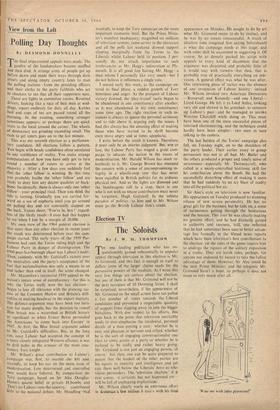View from the Left .
Polling Day Thoughts
By DESMOND DONNELLY
TliE final impassioned appeals were made. The gunfire of the loudspeakers became muffled and then died. A strange army of people got up before dawn and made their ways through dark streets and along empty country lanes to man the polling stations—from the presiding officers and their clerks to the party faithfuls who act as checkers to see that all their supporters vote.
There are lights in committee rooms. Rosetted drivers, looking like a race of best men at wed- dings, report endlessly for duty all day. Kettles boil and cups of tea are passed round all the morning. In the evening, something stronger sometimes appears; or perhaps there are quick Visits to the local around the corner. The wheels of democracy ar,e grinding exceeding small. The rush to get voters goes on to the last minute.
This was my seventh election as a parliamen- tary candidate. All elections follow a pattern. You begin with heady confidence often unrelated to any semblance of reality. You make strange computations of how you have only got to turn round y number of voters to arrive at the Majority x. After a few days you suddenly feel that the 'other fellow' is winning. By this time You probably loathe the 'other fellow' and are ready to deny him any decent qualities or back- bone. Incidentally, there is always only one 'other fellow'—your principal rival. Then you think the tide is turning. Gradually you are carried for- ward on a sea of euphoria until you go around on polling day and are constantly slapped on the back. Voices shout, 'You're in, boy!' regard- less of the likely result--I even had this happen to me when I lost by a margin of 20,000.
My own view of the 1964 general election is that more than any other election in recent years the result was determined before ever the cam- Paign started. The early years of the 1959 Par- liament had seen the Tories riding high and tbe Labour Party in danger of disintegration. The 1960 post-Scarborough phase was Labour's nadir. 1 hen, suddenly, with Mr. Gaitskell's victory over the neutralists and the party's acceptance of the fact that nationalisation was only a means to an end rather than end in itself, the scene changed.
Mr. Macmillan's successful 1959 appeal to the nation's innate sense of complacency-- -for this is Why the Tories really won the last election— began to lose all relevance with the growing suc- cess of the Common Market and Britain's diffi- culties in making headway in the export markets. The defence argument may have been too intri- cate for many people, but the decision to cancel Blue Streak was a watershed in British history as significant as when Ernest Bevin persuaded the Americans `to come back into Europe' in 1947. At first, the Blue Streak argument ,added to Mr. Gaitskell's difficulties. But, in the long run, once Labour had accepted the concept of a more closely integrated Western alliance, it was to drill holes in the armour of the most reac- tionary Tory knight.
Mr. Wilson's great contribution to Labour's Campaign was, first, to muzzle the left and, secondly, to keep his eye on the main issue of modernisation. Less determined and controlled men would have faltered. , By comparison the Tory campaign, based on Sir Alec Douglas- Home's qUaint belief in private H-bombs and 'Don't-let-Labour-ruin-the-country,' contributes' little to the national debate. Mr. Maudling '...'W manfully to keep the Tory campaign on the more important economic level. But the Prime Minis- ter's manifest inadequacy, magnified on millions of television screens, came across to the electorate and all the polls last weekend showed support slipping marginally, from the Tories to the Liberals whilst Labour held its position. I per- sonally do not attach importance to such irrelevancies as Mr. Hoggs indiscretion at Ply- mouth. It is all good fun baiting Mr. Hogg---a man whom I personally like very much—but I do not believe it influences a single vote.
I sensed early this week, as the campaign .en- tered its final phase, a sudden growth of Tory bitterness and anger. As the prospect of Labour victory dawned, the 'play-it-cool' tactic began to be abandoned in one constituency after another, as it was abandoned in my own constituency some time ago. The right reaction in such in- stances is always to ignore the personal acrimony and to ride above it, arguing only the issues. I find this always has the amusing effect of making those who have started to be shrill become eveo more angry and at times apoplectic.
I write before the result is known. Therefore, it must only be an interim judgment. But, win or lose, the Labour Party has waged a great cam- paign to educate the nation in the issues of modernisation. Mr. Harold Wilson has stuck re- lentlessly to it. Mr. George Brown has stumped the country with a sense of uncompromising in- tegrity in a whistle-stop tour that has never been equalled in British politics for its arduous physical test. And as the lights are dimmed and the bandwagons roll to a stop, there is one who is not with us whose contribution must never be forgotten, Hugh Gaitskell. In the infinite paradox of politics --- to him and to Mr. Wilson must go the British Labour lion's credit.


































 Previous page
Previous page